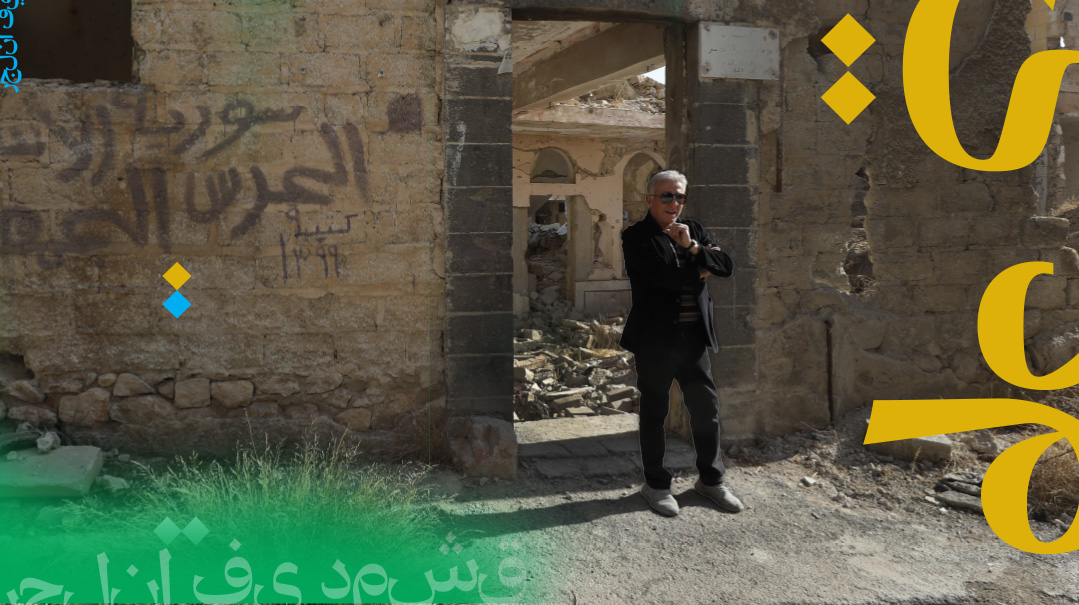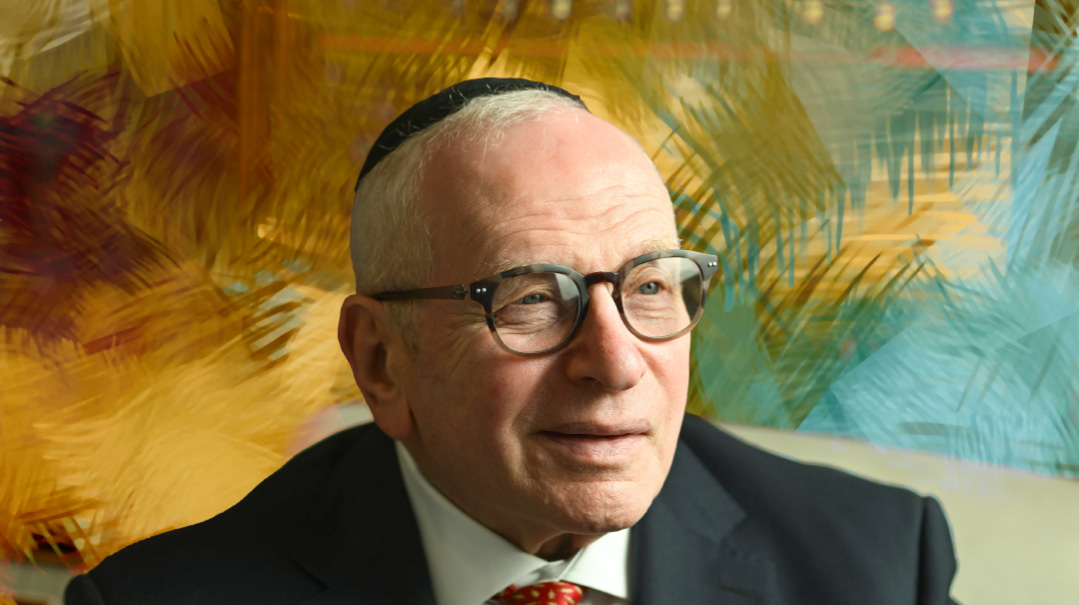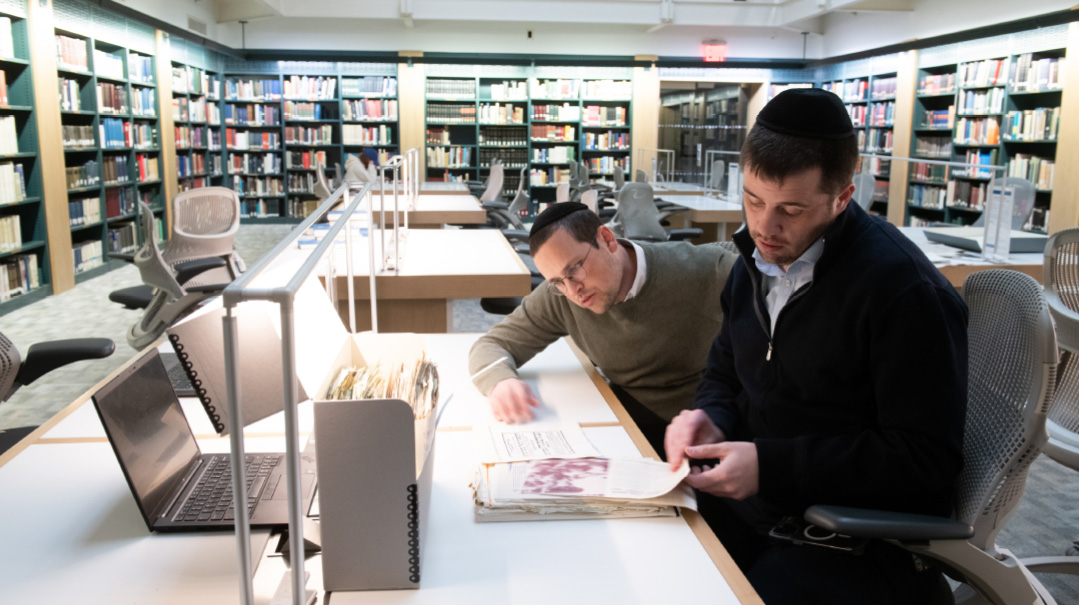Exclusive: Orthodox Diplomacy

In Rabbi Shimon Axel Wahnish, Argentinean president Javier Milei found a mentor — and the perfect ambassador to Israel

Photos: Sinergia Media productora audiovisual
Sometime in late April 2023, with the Argentine autumn under way, a non-Jewish economist-turned-politician with a wild hairdo picked up the phone to a local rabbi to share an outlandish plan. Then-congressman Javier Milei, a libertarian economist who’d spent years railing against his country’s establishment, told his mentor Rabbi Shimon Axel Wahnish that he was planning on running for the presidency of Argentina.
The notion of the former economist ascending to the Casa Rosada was so absurd that the rabbi jokingly upped the ante: “If you become president, I’ll be your ambassador to Israel,” he quipped.
But to Milei — deadly serious about upending Argentina’s political order — the idea was no joke. “Who better than my rabbi to represent my government to Israel?” he replied.
Against all the odds, both sides of the improbable pact came to pass. On November 19, 2023, Hurricane Milei made landfall over Buenos Aires. The much-mocked outsider clinched the presidential race in a runoff, taking over 56 percent of the votes to become the world’s first libertarian president.
Not only did Argentina wake up to a president who is one of the most colorful figures on the international scene — the country is likely to end up with the world’s most unusual ambassador. Subject to Senate confirmation, Rabbi Wahnish — a community rav who’s active in kiruv and was a talmid of Rav Moshe Shapira ztz”l — will move to Israel with his family, and step out into an unfamiliar world of cocktail receptions and diplomacy.
And if all goes to plan, it won’t only be the ambassador’s external garb that will be different — the location will be, too. Alongside President Milei’s promise to break with his predecessors’ socialist economic policies is his pledge to move the country’s embassy to Jerusalem.
That commitment — which will boost Israel’s standing in a region where it has traditionally struggled — is symbolic of the philo-Semitism of one of the most powerful new figures in Latin America. In his first interview after being proclaimed the new president of Argentina, Milei went further; when the journalist asked him if he wanted to thank someone, the new leader replied, “Yes, Hashem.”
The road ahead for the world’s first rabbinical ambassador is paved with unknowns. There’s no precedent within living memory for such a significant international figure to declare interest in conversion, as Javier Milei has, and by extension, there’s simply no playbook for his chareidi rabbi-ambassador to follow. Yet whatever diplomatic turbulence the Argentinean rabbi encounters, his “Next Year in Jerusalem” will be one to remember.
Brotherhood Born
The unlikely bond between the rabbi and the president began forming long before the latter waded into the political arena. Javier Milei was once a marginal economist, with membership in several professional organizations, but no one in the media had his number on speed dial when they were seeking an “expert opinion.”
He did, however, land a position as an economic advisor for a holding company that owned, among other things, a television channel. During another one of Argentina’s endless economic crises, his name was floated to join a panel on a TV talk show. That night, Argentinians were introduced to the man who would lead a social revolution in the years to come.
“We have been made tax slaves of a parasitic, useless, and thieving political corporation!” exclaimed the unknown economist with the wild hairdo — voicing a sentiment unimaginable to the establishment “experts” who usually appeared in such forums.
His appearance was a success. From then on, the disheveled, outspoken economist, always drawing high TV ratings, would gradually become associated with a force scorned by the traditional political parties in this South American country: the right wing.
A brutal economic downturn plunged the country into crisis in 2001. Millions were unemployed, and to keep their families from falling into desperate poverty, the government authorized generous social welfare programs to provide financial assistance. Prices on almost all goods were subsidized in an attempt to soften the impact on wallets. The government began encroaching on the private sector to an unprecedented extent, and many politicians saw an opportunity to turn the crisis into a lucrative venture.
However, this sojourn into full-blown socialism was short-lived. Politicians wielded social aid as bribery to secure votes; corruption was fueled by the billions of pesos printed by the Central Bank, and the fiscal deficit was overwhelming.
At the time Milei launched his candidacy for president, Argentina had the capacity to produce food for 300 million people, more than six times its population of 47 million — but its poverty rate exceeded 50 percent. Six out of ten children were living in poverty, and in a land of such potential abundance, many of them were not receiving the necessary sustenance.
When Milei burst onto the scene, he shattered the myths Argentinians had been hearing for 20 years: He promised austerity, demanded cuts in government spending, advocated for the elimination of subsidies, and, above all, called for getting rid of what he called the “political caste.”
Milei had no political party, no political history, and few allies. He was seen at best as an outsider; at worst, as a madman. Gradually, his rhetoric began to make inroads, especially with the younger generation, who had grown up under the all-encompassing embrace of the state and who were disillusioned with the results.
The unthinkable began to happen: Argentine youth, historically aligned with the left, started talking about the “caste,” quoting economists from the Austrian school, and entertaining the idea that maybe voting for the right wasn’t so bad, after all.
But in Argentina, being labeled right wing carries with it many preconceptions, including one that Milei was unwilling to accept: being anti-Semitic.
“Milei couldn’t understand why he was being accused of anti-Semitism and was determined to reverse that image at all costs,” a representative of ACILBA (Asociación Comunidad Israelita Latina de Buenos Aires), the Moroccan Jewish community led by Rabbi Wahnish, tells Mishpacha. “They reached out to someone in charge of organizing activities in our institution and told us the economist Javier Milei wanted to give a talk to young Jews.”
Not all the activities ACILBA hosts fall under Rabbi Wahnish’s personal supervision. “However, due to Milei being a controversial figure, Rabbi Wahnish asked him to visit before the talk,” the ACILBA official says. “The main fear was that Milei might say outrageous things, and then our institution would be associated with him,” they explained.
The first meeting between the upstart candidate and Rabbi Wahnish (who didn’t know who Milei was) was supposed to last only a few minutes, enough for the rabbi to outline institutional guidelines and make clear to the economist that he was not allowed to speak against any particular party, not even the ruling left-wing Kirchners, one of his main targets.
That meeting lasted two hours. Little is known about what transpired behind closed doors, but when Milei left the office, a brotherhood had been born. Rabbi Wahnish was accepted into Milei’s inner circle, until then occupied only by his sister, Karina (to whom he refers as “the Boss”).
From then on, Milei, whose popularity was growing at an unprecedented rate, proclaimed to every microphone thrust before him that Rabbi Wahnish was his guide and spiritual mentor.
Man of Many Parts
Shimon Axel Wahnish is something of an outlier among the rabbis of Argentina, in the best sense of the term. To understand this, we first need some background about the Argentinean Jewish community.
There are an estimated 180,000 Jews in this South American country, of whom some 40,000 are frum, mostly concentrated in the capital, Buenos Aires, and who trend toward the right end of the religious spectrum. The thriving local Torah scene includes chadarim, seminaries, yeshivos, and kollelim; it’s virtually impossible to find an Israeli yeshivah without an Argentine student.
“In Buenos Aires, there’s a significant Bnei Brak influence,” says one of Rabbi Wahnish’s students.
However, most of the Argentine Orthodox world fits within the distinct profile of the Sephardic Syrian community (Halabis and Shamis). Here, the talmidei chachamim are primarily the dayanim, and all the kollelim focus on halachah. Anyone with a more abstract bent must explore alternative paths or establish connections with rabbis outside the framework of the more traditional and influential kehillot. Many such individuals would, sooner or later, encounter Rabbi Wahnish.
“Axel — as the closest ones call him — is a brilliant mind,” says Rabbi Uriel Goldcher, a student of Rav Wahnish. “Without exaggeration, he is the smartest person I’ve ever met in my life. He’s an artist in creating order and clarity to understand and bring down to earth the loftiest concepts. What has always amazed me is his ability to articulate the most complex concepts of Judaism in a few clear words.”
An example of Rabbi Wahnish’s search for depth and clarity is in the attention that he’s given to the works of the Ramchal. In 2022, he founded the “RAMJAL Foundation,” dedicated to the translation and dissemination of the writings of the great Rabbi Moshe Chaim Luzzato.
Given Rabbi Wahnish’s well-known penchant for delving deeply into all aspects of religion, his growing connection to Milei generated great suspicion among some of his students. “How can he connect with a guy who not only isn’t Jewish but also knows nothing about Judaism?”
However, those who know Rabbi Wahnish insist that no one was more astonished by the strength of this connection than the rabbi himself. “Axel was surprised by Milei’s ability,” says one student. “It seems that this man is brilliant. If he weren’t, the connection wouldn’t have lasted even two seconds.”
But they also insist that intellectual capacity alone was not sufficient for Rabbi Wahnish to have formed the connection. If Milei had been given such access, he had to possess something more, something that Rabbi Wahnish did not expect to find in him.
“From what I know, Axel and the president have an absolutely genuine connection, forged in their shared 100 percent belief that Hashem runs the world,” says Rabbi Tzvi Klor, the head of the Latin department at Aish HaTorah.
Rabbi Klor has been friends with Rabbi Wahnish for over 20 years and is someone with whom the future ambassador has very open conversations. “Axel is a talmid chacham, intelligent, and a very upright person. We’ve been working in collaboration between his community and Aish HaTorah for over 20 years, and I can attest that there’s no ulterior motive — they connected on a spiritual level.”
Javier Milei finally assumed the presidency of Argentina on December 10, the fourth night of Chanukah. Numerous international leaders attended the inauguration, including Ukrainian president Volodymyr Zelensky, whom Milei gave a Chanukah menorah. Photos of Putin’s main adversary with the iconic candelabrum circulated worldwide.
However, on this momentous day for the country, that wouldn’t be Milei’s only nod to the Jewish community. In his inaugural speech, in front of hundreds of thousands of people, the new president of a country where Jews make up less than 0.5 percent of the population declared: “It’s not a coincidence that this presidential inauguration occurs during the Chanukah festival, the festival of light, as it celebrates the true essence of freedom. The Maccabean war is a symbol of the triumph of the weak over the powerful, the few over the many, light over darkness, and above all, truth over lies, because you know I prefer to tell you an uncomfortable truth than a comfortable lie.”
Although Milei’s speech was significant, for Rabbi Shimon Axel Wahnish, the best was yet to come.
Taste for Diplomacy
Despite not having had an Orthodox upbringing, Shimon Axel Wahnish found himself drawn to the study of Torah from a young age. With effort and dedication, he was accepted into Yeshivat HaNegev in Netivot, the institution then led by Rav Yissachar Meir ztz”l. He forged a close bond to the Rosh Yeshivah and also joined the shiur of Rav Aryeh Leib Levy, the current rosh yeshivah. However, his stay in Israel was briefer than he would have wanted, and he soon returned to Buenos Aires, where he went on to earn a degree in educational psychology. Once he was married, he focused primarily on kiruv.
“Axel always made me feel like part of his family,” says former student Rabbi Ariel Hansani, currently a maggid shiur. “I spent many Shabbatot at his home, and we talked a lot. He’s someone who, on the one hand, presented study in a very engaging way. But at the same time, in personal interaction, he listened, was interested in helping you, put himself in your shoes, and tried to understand. Studying with him gave me the push to dedicate my life to Torah study.”
In a similar vein, former talmid Rabbi Ishay Lakerman says, “If I have to highlight one quality, it’s that he somehow knows how to understand what someone is going through. He has a surprising ability to read a person.”
There’s a popular saying in Argentina: “G-d is everywhere, but especially in Buenos Aires.” It’s a sly critique of the tendency to centralism in this country, but in Argentina’s Jewish community, it’s understood to mean that despite the country’s vast expanse, the Torah centers gravitate toward the capital city. For those living in the hinterlands, connecting with genuine Judaism has long been seen as practically impossible.
And that was precisely the reason for Rabbi Wahnish’s first project. In 2000, he became the director of Alas (“Wings”), an organization dedicated to bringing Torah to young Jews scattered across the country.
“That project saved many neshamot,” says Rabbi Klor of Aish HaTorah. “Many families owe their spiritual lives to what Axel did in the country’s interior.”
His kiruv career took a leap forward when he began teaching at Menorá and Sucath David, probably the largest outreach institutions in Argentina, giving him access to a much larger number of young people. Their connection with “Axel,” as they called him, was immediate, and this is when “the talmidim of Rabbi Wahnish” began to emerge.
Rabbi Jonathan Berim, along with Rabbi Wahnish, was one of the youth directors of Menorá. “Axel had the ability to be very intellectual but also very warm with the kids,” says Rabbi Berim. “In addition to being a good teacher, he was a very good leader for the rabbis on the team.
That connection gave Rabbi Wahnish the privilege of being Rav Shapira’s chauffeur every time he visited Argentina. “We knew that if Rav Moshe was coming, we would have to adjust Axel’s class schedules,” a student tells me. “During the days Rav Shapira was in Buenos Aires, Axel made himself completely available to the rav. He drove him everywhere. Axel found in Rav Shapira the spiritual guide he had always dreamed of.”
Although Rabbi Wahnish was making headway among one sector of population, in 2012 the Moroccan community under ACILBA was battling a larger demographic trend. The oldest Sephardic kehillah in Argentina was dwindling.
“The older Moroccans cared mostly about securing a Jewish burial site and just came for the holidays — they didn’t even show up for Shabbat,” a member of the community explains.
The kehillah needed someone who could attract a young audience, something Rabbi Wahnish had prepared for his entire life. That year, he was appointed as dean and chief rabbi of the Superior Moroccan Sephardic Rabbinate of Argentina. That grandiose title involved visits from great rabbis, meetings with kings and ambassadors, and, perhaps unknowingly, instilled in him a taste for diplomacy.
Rabbi to the President
The Metropolitan Cathedral of Buenos Aires, located in the heart of the capital, has historically been a stage for power struggles between politicians and the clergy. Ironically, this was the backdrop against which Rabbi Wahnish became a national Argentinean phenomenon.
As part of the official events commemorating President Javier Milei’s inauguration, an “interfaith ceremony” was organized at the Cathedral. Representatives of the major religions were selected to express their best wishes and offer blessings to the new president. Representing the Jewish community was, as could only be expected, Rabbi Shimon Axel Wahnish.
“The proposal was a bit unusual because, on the one hand, we all know it’s forbidden to go to a church,” says a source close to Rabbi Wahnish. “On the other hand, failing the president on his inauguration day wasn’t part of the plan.”
The question reached the desk of Rav Asher Weiss.
“Axel doesn’t take a step without consulting Rav Asher,” says the source.
The psak was that Rabbi Wahnish was obligated to participate in the ceremony.
The first three speakers were representatives of the country’s main religions, and their speeches hit all the expected notes. Next up was Rabbi Wahnish.
Unlike the others, Rabbi Wahnish didn’t bring a prepared speech. For much of his talk, he practically ignored the large audience, instead speaking directly to his friend and student, the president. From the moment his teacher took the stage, the cameras focused on a visibly moved Milei.
“Axel” took the microphone and walked across the stage, as if giving a shiur. Avoiding citing specific sources, he spoke of rising from falls, moving forward together, and the country’s need to stand up and forget conflicts. Furthermore, he spoke about the topic that unites him with the president: emunah in Hashem.
“There’s something very curious,” Rabbi Wahnish said. “Much is said about the faith that man must have in G-d, but sometimes we forget a small detail, which is the faith that G-d has in man. G-d asks us for things and has faith in us. G-d has faith in you, Mr. President.”
At that moment, the television cameras captured Milei breaking down and tears streaming down his cheeks.
Those in the know understood what those tears meant. In recent years, Milei had become something of a “ben bayis” of the Wahnish family. He spent Shabbos, chagim, and family simchahs with them. The rabbi’s children simply call him “Javier,” as one of their own. In fact, last Rosh Hashanah, the man who would become president shared a seudah with the Wahnish family.
“He genuinely believed that at that moment [on Rosh Hashanah], the judgment of whether he would be chosen or not was taking place, and that’s why he went there,” they told me.
The media praised Rabbi Wahnish’s words. Argentines wondered who this man was who had delivered such a sincere, profound, and hopeful speech. The same day, “Rabbi” became a trending topic in Argentina.
Shimon Axel Wahnish, who had constantly avoided the cameras, providing spiritual support only from the shadows, had unexpectedly become a star. And, like any star, he would have to learn to deal with the challenges of fame.
Kiddush Hashem or Political Peril?
The Jewish community’s relationship to politics has always been a subject of concern in Argentina. Over the years, the community has had to tread a fine line in lobbying to defend its interests in a country that is not only politically tumultuous but has also been the scene of two of the world’s worst terrorist attacks against Jewish targets: In 1992, an attack on the Israeli embassy in Buenos Aires left 22 dead, and in 1994, the bombing of the AMIA community center resulted in 85 deaths and more than 300 injuries.
In parallel, diplomatic relations between Argentina and Israel have fluctuated. While anti-Semitism or anti-Israel sentiment have never been officially promoted, the Kirchnerist governments that led Argentina for 16 of the last 20 years have aligned with anti-Israeli regimes such as Venezuela, Bolivia and Iran. Iranians freely moved within Argentina, and a 2013 Memorandum of Understanding between the two countries is a sensitive domestic issue in Argentina. While supposedly meant to facilitate bilateral cooperation in investigating the AMIA attack, the agreement is widely perceived as a quiet understanding intended to protect Iranian interests.
Given that volatile history, only secular Jews such as Sergio Bergman, who served as a Minister of the Environment between 2015 and 2019 have engaged in frontline politics. Religious Jews have traditionally chosen to keep a low political profile — a fact that has changed dramatically with Milei’s ascent to power.
“Milei’s connection with Judaism doesn’t go through institutions, but through the Torah,” says an Argentine rabbi who requested anonymity. “Never in the history of any country outside of Israel has there been a president who loves the Torah as much as Milei. He genuinely enjoys studying. In fact, it would be great if some of our people had the faith in Hashem that the president has.”
The arrival of a leader who openly confesses his intention to convert to Judaism after his term ends (according to sources, he wanted to do so earlier but was advised to wait), who says that after leaving public office he wants to dedicate himself to Torah study, who waves the flag of Israel at his events, travels to the Ohel of the Lubavitcher Rebbe, and doesn’t take a step without first sharing his decision with an Orthodox rabbi whom he designates as a representative to Israel, did not sit well everyone in the community, not even in all sectors of the religious world.
“Axel knew that sooner or later they would criticize him,” says a close associate of Rabbi Wahnish. “That was expected. What bothers him is the arrows from within the community.”
The reservation that many have put forward is that attaching oneself to such a controversial figure in a country as fragile as Argentina can have negative consequences.
“If Milei fails, the first thing anti-Semites will say is that it happened because he got close to the Jews,” says the Argentinean rabbi.
Rabbi Wahnish, say those close to him, flatly rejects these criticisms. “There is a very clear cultural division between Ashkenazim and Sephardim on the issue of political power,” a source from the Rabbi’s office contends. “Ashkenazim have suffered so much and have been so betrayed by governments in Europe that they argue one should not associate with the government. This has not been the case in the Sephardic world. There have been famous rabbanim well-known cases, for example, the Rambam and Don Yitzchak Abarbanel, who were confidants of kings.”
But Rabbi Wahnish has not taken the leap on his own and has consulted daas Torah on his unprecedented situation. On halachic matters he consults Rav Asher Weiss, and on questions of hashkafah he consults Rav David Abuchatzeira. “Both Rav Asher and Rav David have told him that it is a major kiddush Hashem and that he has to move forward with the ambassadorship.”
One of the pressing questions on many minds is how Rabbi Wahnish will reconcile his religious life with the demands that diplomacy may impose. What happens if there’s a meeting on Shabbos? How will he handle a formal dinner where specific levels of kashrus are required? What will be his reaction if an unavoidable meeting falls on a Yom Tov?
The response from those close to the rabbi is clear: “Axel always says that Hashem will provide the necessary strength and tools to fulfill the role in the best possible way. For him, this is a matter of kiddush Hashem, and he believes that any challenges the position may present will come with the corresponding siyata d’Shmaya to navigate them.”
In Rabbi Wahnish’s office there’s also confidence that his arrival at the embassy will enhance the bilateral relationship with Israel: “For the first time, there’s someone who understands Israeli society, who speaks the language on equal terms with officials — in fact, he was the translator in the recent conversation between Milei and President Isaac Herzog — and who sees how Argentinians and Israelis can bolster their connection. Quite beyond his religious outlook, it’s an advantage for all Argentinians.”
Rabbi Wahnish also feels that this could be a unique opportunity for the Torah world. “Having a chareidi ambassador could open many doors for religious people,” a source says. “Many nonreligious people can have firsthand contact with a Torah scholar, kiruv trips to Israel can include talks with the ambassador, and there is a voice with diplomatic weight that defends Torah values. The possibilities that Axel sees in this opportunity to expand Torah to an audience that has never reached it are immense.”
Miraculously Spared
Closer to home, the Wahnish family sees the chance to move to Israel as a Divine message that goes back to the most difficult times they have lived through.
Just over two years ago, Argentina’s religious community received an urgent message: “Please pray for the refuah sheleimah of Valeria Tova bat Leonor and Shulamit Odaiah bat Valeria Tova.”
Rabbanit Valeria Wahnish, a beloved and active figure in ACILBA and Argentine kiruv circles, was very ill, and her condition became critical while she was seven months pregnant. The baby, Shulamit Odaiah, had to be urgently delivered and was transferred to the neonatal unit. Doctors told Rabbi Wahnish that there was no chance the baby would survive, and it was likely that his wife wouldn’t either.
As the Rabbanit — known as Vale — said Vidui and Shema, all hopes were pinned on at best, her survival. Not even the most optimistic thought that the baby could make it as well.
“That was the most challenging moment in Axel’s life,” a close associate says.
There are no coincidences in life; and that dark period came during the time he met with Javier Milei. Seeing the bond they had and still have, everyone is sure that Rabbi Wahnish, in some way, leaned on Milei.
“True friendships strengthen when you have to go through tough times,” the source says.
A person close to the rabbi confessed that during those days, Shimon Axel dedicated himself more than ever to talking to Hashem. “He asked for the opportunity, please, to have the merit of living with his family in Israel, even if only for a while. That was a dream they had yet to fulfill, and they didn’t want to leave This World without achieving it.”
Against all odds, Rabbanit Valeria’s operation was successful. Doctors noticed a gradual improvement, and even the baby also showed some signs of stability.
“The doctors couldn’t believe it,” a family member says. “They themselves said what was happening with the baby was miraculous.”
Four months later, Shulamit Odaiah Wahnish would leave the neonatal unit, and just a few days ago, against all odds, she celebrated her second birthday.
Mission Control
Against that background, Shimon Axel Wahnish is living this moment with the certainty that Hashem has given him a mission of being Argentina’s ambassador in Israel. In his inner circle, they joke, “This is what you asked G-d for when Vale was in the hospital.” He is the first to say that the ascent to the presidency of someone who trusts Hashem as much as Javier Milei does — and who burst onto the Argentine scene so recently, “is a nes galui.”
As he prepares to take up his diplomatic posting, he’s requested temporary leave from his role as Chief Rabbi of the Moroccan Community in Buenos Aires; the communal leadership of ACILBA will transition into the capable hands of his brother and right-hand man, Rabbi Hernán Wahnish.
When Congress approves his appointment, this 42-year-old father of six will not only be the most visible chareidi figure in a political position outside of Israel but will also be responsible for leading the historical relocation of the Argentine embassy to Jerusalem, one of the many promises Milei has made, following in the footsteps of Donald Trump. While Rabbi Wahnish’s office says the embassy move “will take time,” what will happen immediately is the move of the ambassador’s official residence to Israel’s capital.
As Argentina’s new ambassador prepares to pack his bags for Jerusalem, he sees it as a fresh stage to fulfill his life’s goals of disseminating Torah and trying to improve the lives of Argentine Jews. It’s an opportunity that has come from nowhere, one that reinforces the family’s convictions that nothing happens by chance.
It’s a belief that Rabbi Wahnish shares. So does his president.
(Originally featured in Mishpacha, Issue 996)
Oops! We could not locate your form.







